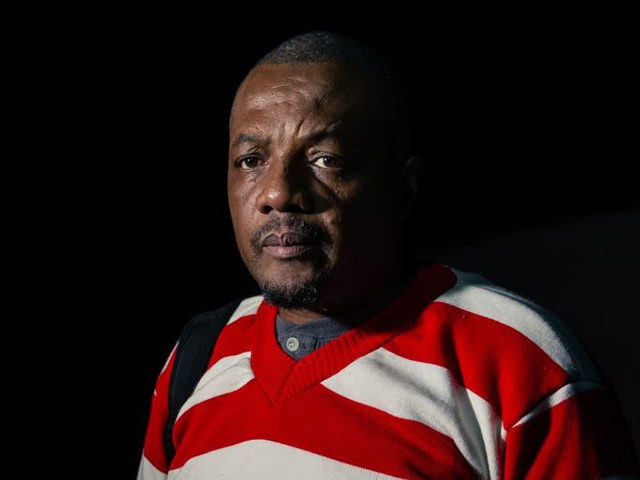Hopewell Chin’ono, an award-winning journalist in Zimbabwe — recently jailed after exposing the government theft of millions of dollars meant to fight the Chinese coronavirus pandemic — called the current leadership “worse than Robert Mugabe” in his first extended interview since his release.
President Emmerson Mnangagwa took power from Mugabe, who he served as vice president, after a military coup in 2017. Both Mugabe and Mnangagwa are members of Zanu-PF, the ruling socialist party. Mnangagwa chose to keep Mugabe’s decades-long alliances with other communist tyrannies such as Cuba, China, and North Korea when he assumed power.
Mugabe revealed shortly before his death that Mnangagwa played a critical role in the Gukurahundi, the genocide of an estimated 20,000 people between 1983 and 1987.
Chin’ono explained to South African radio host Clement Manyathela how he had found that Mnangagwa, his family, and government cronies had established fraudulent shell corporations abroad to buy overpriced personal protective equipment (PPE) from China for hospitals treating coronavirus patients. Politicians would allegedly pocket the extra cash charged to the Zimbabwean people and, Chin’ono’s reports revealed in May, leave the nation’s health workers unprotected.
In one particularly outrageous incident, Chin’ono found health workers wearing bedsheets while treating patients, as they did not receive any other protective gear.
Police arrested Chin’ono on July 20 after he had expressed on social media support for a peaceful protest organized against the socialist regime, accusing him of inciting violence. Authorities released him on bail, amid mounting international pressure, last week.
Speaking to Manyathela on his Radio 702 program, Chin’ono accused Mnangagwa of appointing his nephew to run an anti-corruption operation in the country that, in practice, was persecuting those exposing corruption. He described the prison he spent his time behind bars in as a “Nazi concentration camp” and accused Mnangagwa of trying to “instill the fear of God, not only in myself as an investigative journalist, but also to other journalists, especially the young ones.” He said his arrest “was directed from Emmerson Mnangagwa’s office” personally.
The message his arrest sends to other pro-democratic forces and writers in the country, Chin’ono said, is, “We will send you to prison and we will make sure that you rot there.”
“The whole world knew and knows that I was arrested because of the corruption exposures. Even the policemen at the police station, they would privately tell me that,” Chin’ono asserted.
“You know you are being incarcerated because of the exposures, the president is upset that you have tarnished his name and that of his family,” Chin’ono said officers told him.
“It was a well-known fact that that was the reason why I was arrested. I had been warned through a press conference by the spokesperson for Zanu-PF … Patrick Chinamasa held a press conference saying I was tarnishing the name of the president’s family and I should stop that,” Chin’ono recalled.
At the press conference, Chinamasa said, “We have noted the systematic targeted attacks on the first family members … by unscrupulous characters like Hopewell Chin’ono targeting the president’s son.”
Manyathela offered Chin’ono a platform to discuss in detail the allegations he had made against Mnangagwa that he believes led to his arrest. Despite having spent six weeks behind bars in conditions he described as atrocious, Chin’ono appeared to risk another arrest by accepting the offer.
“They basically set up shell companies that did not exist,” he narrated. “Some were based in South Africa, some were based in Namibia, some were based in Dubai, and another one was based in Hungary. They never, ever … the companies did not exist.”
Chin’ono noted that his research revealed that the administrator of the shell company in Namibia was someone close to Mnangagwa, and the Namibian government verified to Chin’ono that the company had no known activities in the country and had never paid taxes. In response, both the Mnangagwa family and the company issued statements denying that they had ties to each other, but, Chin’ono revealed, the letters appeared to be written by the same person.
“The Namibians helped me to prove that this company had never actually existed and that it had never paid taxes in Namibia, and yet here it was getting huge contracts in Zimbabwe,” the journalist noted. “They were buying things from China, one receipt which I managed to get through DHL — they bought something for $380 and the government of Zimbabwe was billed $6,000-8,000.”
Chin’ono concluded that the excess cash ended up in the private funds of the first family of the country.
“Nobody thought that anybody could be worse than Robert Mugabe, but Emmerson Mnangagwa has just proved us wrong — that, indeed, he is worse than Robert Mugabe,” the journalist lamented.
Chin’ono’s parting thought to his nation was a reminder that Zimbabwe is a country rich in natural resources and human capital — impoverished, he asserted, only by a corrupt, larcenous elite.
“I think the most important message to Zimbabweans — and to South Africa, because we are sort of intertwined — is that Zimbabwe is rich. Zimbabwe is wealthy,” Chin’ono said. “But Zimbabweans are poor. They are always going to South Africa, some risking their lives crossing through the crocodile-infested Limpopo River simply because we have a state, we have a government, that does not care about its people.”
“The looting of public funds, the plundering of national resources is what has made Zimbabweans poor,” he concluded, vowing to continue to expose the current government despite the abuses he has already endured.

COMMENTS
Please let us know if you're having issues with commenting.